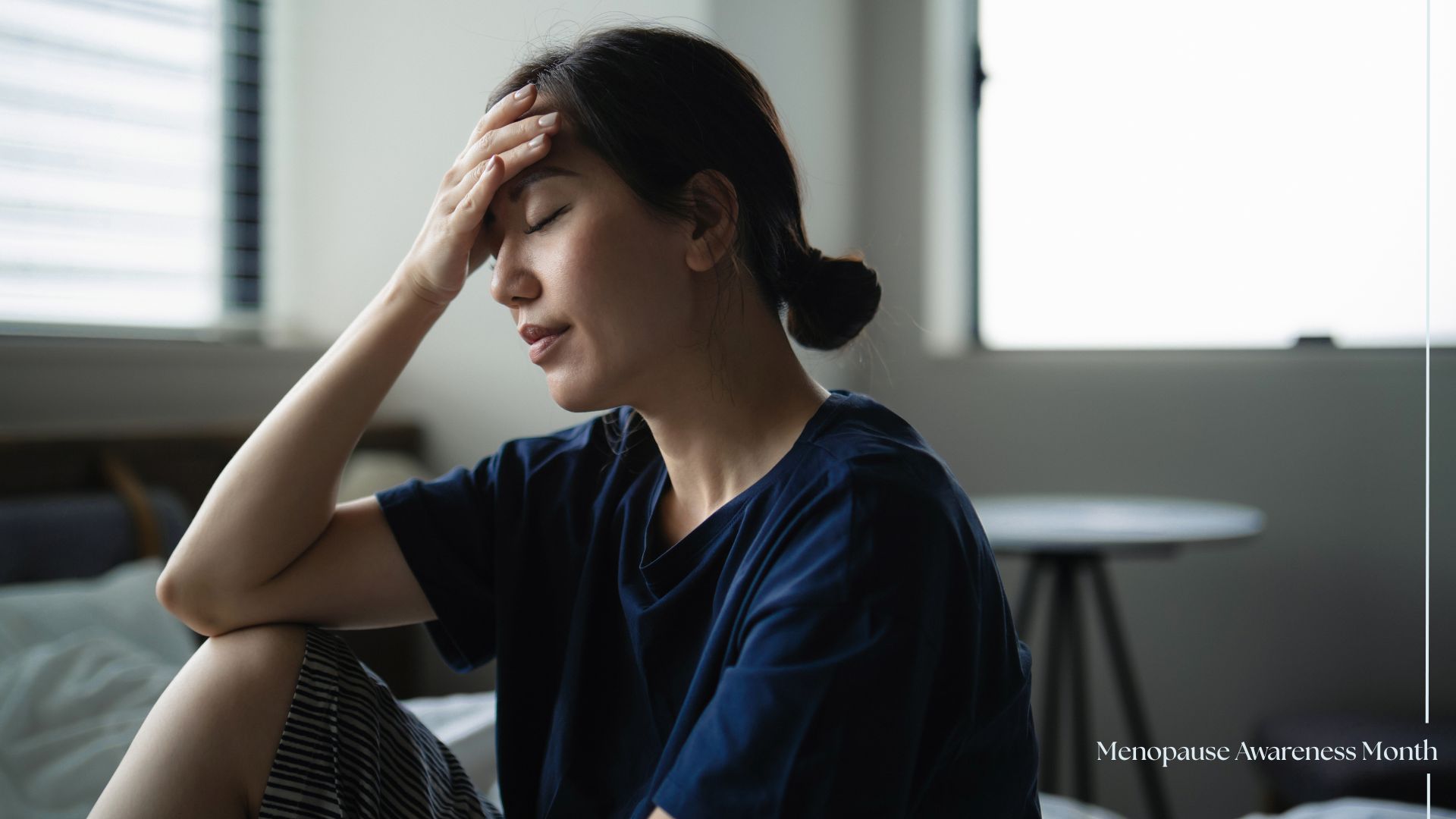Perimenopause fatigue can be 'overwhelming' - here's how to deal with it
Symptoms like disrupted sleep, mood swings, and low vitamin levels go hand-in-hand, creating the perfect cocktail for perimenopause fatigue

Sign up to our free daily email for the latest royal and entertainment news, interesting opinion, expert advice on styling and beauty trends, and no-nonsense guides to the health and wellness questions you want answered.
You are now subscribed
Your newsletter sign-up was successful
Want to add more newsletters?
Energy fuels everything. It’s the oomph that gets us out of bed in the morning, and it keeps us going when life gets tough. So, what happens when fatigue is top of your list of perimenopause symptoms?
A new survey led by Land of Beds found that over half of women rated their sleep as 'poor' or 'very poor' during menopause, and two out of three reported an impact on their mood and concentration.
"The lack of sleep really affects my concentration during the day, and the fatigue can be overwhelming. The dread when I wake up is impacting my quality of life a lot," said one woman who contributed to the report.
If you’re finding that lethargy is getting in the way of life, it's time to speak to your doctor, as this is often what perimenopause feels like, but that doesn't mean you should put up with it. There are options available, including medication and alternatives to HRT. In the meantime, maybe it’s time to fine-tune your energy levels. Often, it’s not more hours in the day we need, but a get-up-and-go hit to power us through.
Does perimenopause cause fatigue?
Yes, perimenopause can cause fatigue as fluctuating hormone levels impact sleep and have a knock-on effect on mental and physical wellbeing, says Dr Nerina Ramlakhan, a sleep physiologist.
"Poor sleep increases irritability, anxiety, and depressive symptoms. Insufficient sleep impairs emotional regulation, decision-making, and concentration, creating a vicious cycle in which hormonal shifts lead to poor sleep, which in turn intensifies mood problems," she says.
This poor sleep is caused by an imbalance of oestrogen, progesterone, and testosterone that comes with the lead up to menopause, but other factors can also play a crucial role.
Sign up to our free daily email for the latest royal and entertainment news, interesting opinion, expert advice on styling and beauty trends, and no-nonsense guides to the health and wellness questions you want answered.
For starters, women and men tend to get more tired with age thanks to a loss of muscle mass. "We lose 8% of our muscles every decade from the age of 40," explains Imogen Watson, dietitian and medical manager at Abbott Healthcare. "Muscle strength, energy balance, and feelings of exhaustion are strongly dependent on each other and can create a lasting feeling of fatigue as we age."
High cortisol levels can be the other key contributor, as well as the lifestyle habits (like drinking alcohol) we may rely on to try and lower our cortisol levels. "Excessive stress that is not managed properly and eventually becomes chronic will weaken your adrenal glands and impair your ability to cope, ultimately depleting your energy," says Yuri Elkaim, health and fitness expert and author of The All Day Energy Diet.
Certain medical conditions, such as an underactive thyroid, diabetes and chronic fatigue syndrome, can cause low energy. Tiredness can also cause extreme fatigue, and these aren't connected with perimenopause.
Look out for red-flag symptoms that accompany your low energy. If you have weak muscles, breathlessness or feel generally unwell, see your GP. If you’re in the UK and want to fast-track, a private health check will get to the source of your sluggishness through tests on blood health, thyroid function and protein levels.
How to combat perimenopause fatigue
1. Look at your diet
When it comes to eating for energy, nutritionist Angelique Panagos, author of The Balance Plan, suggests foods that balance your blood sugar levels. "Try to focus on nourishing, energising foods that are simple to prepare. Enjoy wholegrains and complex carbs such as sweet potatoes and oats for a hit of lasting energy, and vitamin B-rich foods, which help to convert food into cellular energy," she says.
"Also, make sure your diet includes plenty of essential fatty acids. These aid our energy production, improve our metabolism and increase the rate at which oxygen is used. For the ultimate energy-boosting meal, add in protein and some chromium-rich foods, such as rye bread, apples or eggs," she says.
There's also plenty of research that suggests a vegan diet for menopause could be more beneficial as it "allows for a higher consumption of macro and micronutrients, causes less inflammation generally in the body and sees improvements in the gut microbiome,’ says Dr David Jack.
"It’s possible to experience a surge of energy, either by switching from meat completely or upping the plant-based meals you eat," he says.
2. Prioritise movement
If you're dealing with menopause fatigue, exercise is probably the last thing you'll want to do, but it's proven that working out can actually help you feel less tired and boost energy levels. For example, a review in BMC Women's Health found that doing aerobic exercise (like walking) three times a week had the most positive effect on women in menopause.
"Regular exercise that becomes part of your daily and weekly routine is what will boost your endorphin levels and consistently lift your mood. It will also improve the blood flow throughout your body, which means everything gets transported around more quickly and efficiently, especially blood and oxygen, which are vital for energy, leaving you ready to go," says Liz Shaw, health and fitness tutor at The Training Room.
We all like different kinds of exercise, so do what works best for you. If you'd rather do an outdoor walking workout than 15 minutes of Pilates at home, pull on your trainers and head out the door, and vice versa.
As much as many people don't do enough exercise in menopause, many do too much. "Warning signs [that you're doing too much] might include having excessively sore muscles for days on end, or arms or legs that feel like dead weights," says Liz.
"Feeling irrationally irritable is another indicator, as is experiencing a desperate need to sleep or not being able to fall asleep. Either of these suggests the body has gone into 'stress mode' rather than getting the positive gains of just enough."

Studies show that yoga and light aerobic exercise can ease perimenopause fatigue.
3. Rethink your rest
First things first, ditch the eight-hours-a-night myth. "It’s the amount of sleep over 24 hours that is important, rather than the amount of sleep that takes place during the night," says Dr Chris Idzikowski, director of the Edinburgh Sleep Centre and author of Sleep Well.
"Researchers divided an eight-hour sleep period into two four-hour periods and kept one of those at the same time every day. This is called anchor sleep. They found that sleep rhythms quickly reestablished themselves if anchor sleep was maintained, and it didn’t really matter when the other four hours occurred," he says.
That means naps are doctor-approved - but when you wake up, avoid hitting the snooze button to get better core sleep. "Falling asleep again will leave you feeling groggy because you put your body and brain out of sync with their natural rhythm," says Rob Hobson, nutritionist and author of The Art of Sleeping.
It's also a good idea to wake up and fall asleep at the same time every night. "We all want to catch up on a few extra hours’ sleep, and many people look forward to the Sunday lie-in. But changing your sleeping pattern can knock your body out of routine for the coming week. It’s best to try and stick to the same bedtime and wake-up time if possible," says sleep and insomnia specialist Dr Irshaad Ebrahim. Napping can also help improve performance.
4. Stock up on supplements
It's not possible to supplement your way to a better menopause, but adding more vitamins and minerals to your diet may help. "Increasingly, women are turning to natural supplements, and although the research outcomes are still unclear, it can be worth exploring for many. These include omega-3 fish oils, vitamin D, probiotics, and magesium" says Dr Ramlakhan.
Magnesium can be particularly beneficial for those dealing with perimenopause fatigue as it "helps the body to activate our energy cells", says Dilan Patel, a personal trainer and nutritional advisor. "Not getting enough can lead to fatigue, nausea, and a loss of appetite. It also aids muscle relaxation and binds to a neurotransmitter that reduces anxiety, in turn reducing insomnia. There's no better energy boost than good sleep."
You can do this through oral supplements or by eating more foods rich in magnesium, such as nuts, bananas, and leafy greens.
What does perimenopause fatigue feel like?
Perimenopause fatigue will feel like deep exhaustion that can leave you feeling drained, with brain fog, struggling with regular activities, and generally unmotivated and lethargic. There might even be physical symptoms - like having a weaker grip.
Another participant in the Land of Beds survey described her sleep problems and associated fatigue as "the worst time of my entire life", with the constant interruptions making her "irritable in the day and very tearful".
Senior Health Writer Ali Horsfall has almost 15 years experience as a journalist and has written for national print titles and women’s lifestyle brands including woman&home, Woman, Woman's Own, BBC magazines, Mothercare, Grazia and The Independent. She currently specialises in health and fitness content and loves sharing the best expert advice on staying well.
You must confirm your public display name before commenting
Please logout and then login again, you will then be prompted to enter your display name.


